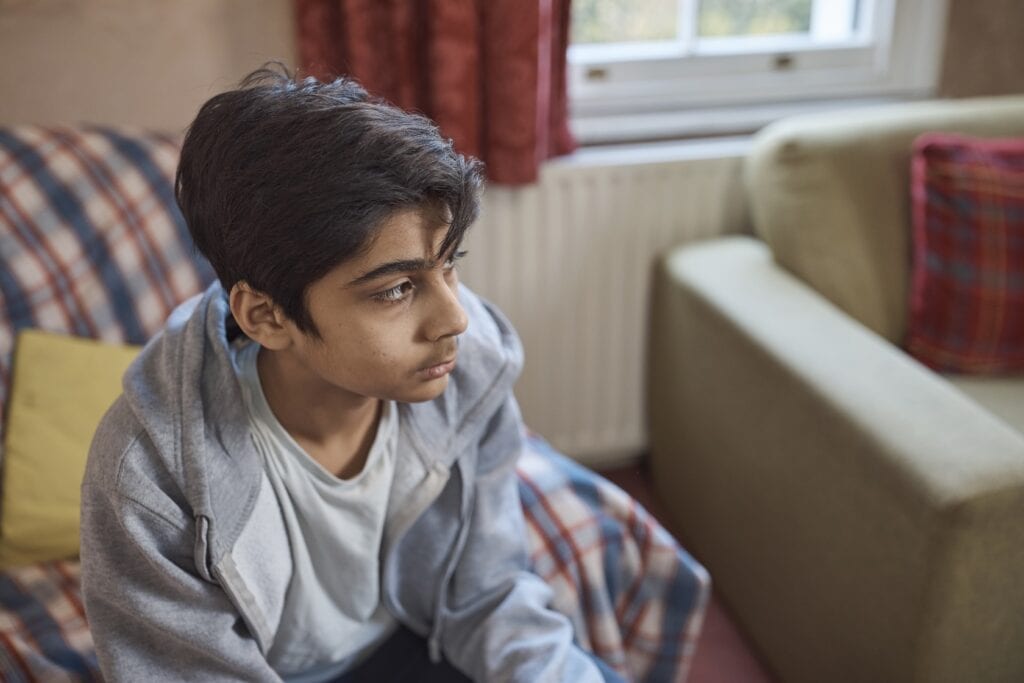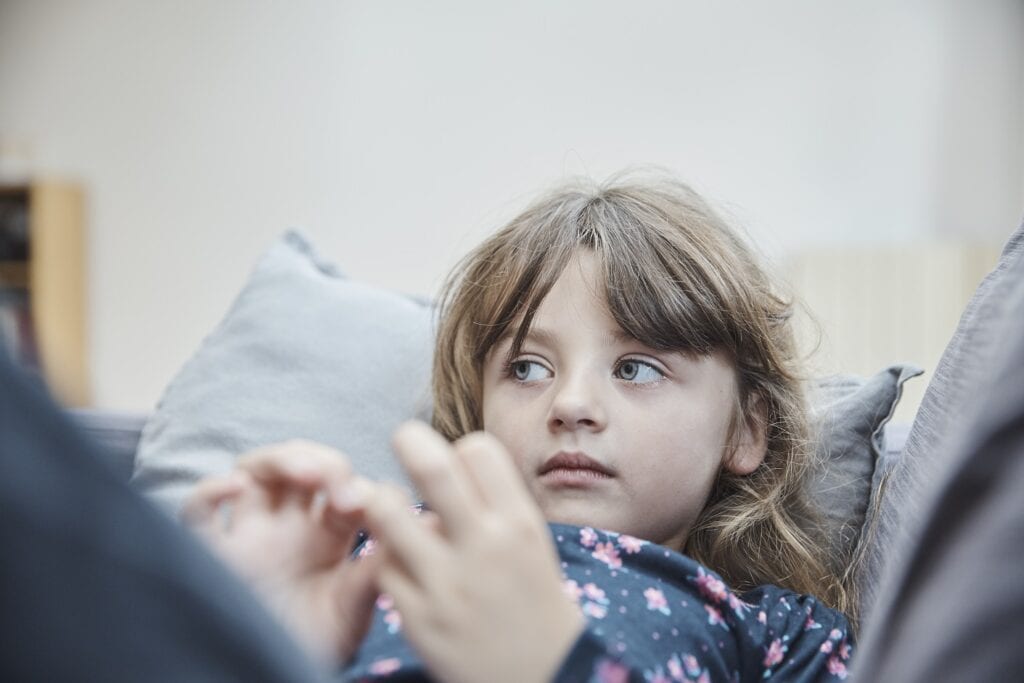- NSPCC Cymru and Welsh Women’s Aid demand action over underfunded support services for children who live in families with domestic abuse
- Experts share concerns around lack of investment in specialist support services in Wales
- Latest NSPCC helpline figures reveal 25 referrals a month made to agencies in Wales during lockdown about domestic abuse
Pressure is growing on Welsh Government to ensure children who have experienced domestic abuse are able to access specialist support services to help them recover no matter where in Wales they live.
Despite the Violence Against Women, Domestic Abuse and Sexual Violence (Wales) Act 2015, which was supposed to provide all victims with equal access to support, services for child victims remain patchy and underfunded in many parts of Wales.
NSPCC Cymru and Welsh Women’s Aid joined forces to host a virtual round-table of leading professionals and charities in Wales, which highlighted the clear need for more action with existing services already over-stretched.
It comes as new NSPCC helpline figures reveal that the service made 126 referrals to agencies in Wales between April and August 2020 – an average of 25 a month.
Chaired by John Griffiths MS, chair of the Equality, Local Government and Communities committee in the Senedd, the event held on Thursday 24 September, brought together professionals from the third and public sectors in Wales, including policing, specialist services and Welsh Government to discuss the postcode lottery of service provision for children in Wales impacted by domestic abuse and violence as well as the impact lockdown has had on child victims and already stretched services.

The restrictions on everyday life resulting from the coronavirus pandemic increased the risk for some children of experiencing domestic abuse in their home with an increase in calls to helplines. However, Welsh Women’s Aid shared how specialist support services reported drops in the number of children supported in the community as lockdown presented barriers to support.
The round-table revealed how professionals and charities share growing concerns at the lack of action being taken by Welsh Government around providing sustainable specialist support services to help children who have lived with domestic abuse in Wales.
With professionals across the sector anticipating a surge in referrals from families who have experienced domestic abuse over the last six months, it highlights the mounting need for services that help children recover and action to ensure health board and local authorities have sufficient resources in place to provide children with the necessary support.

It’s a view shared by survivors of abuse. Jess, 30, lives in North Wales and lived with domestic abuse for over 15 years as her father beat her mother throughout her childhood.
“Living with domestic abuse is traumatic and being exposed daily to such emotional torture has a lasting impact, which is why specialist support services for families who have been through abuse like I have, are so needed. They can be life-changing
“Lockdown has been a stressful time for us all and it’s when emotions are heightened that things can get so much worse for families living with domestic abuse – that really worries me.
“Too often children are being overlooked in these situations because they might not be the ones being physically harmed, but that mindset and approach has to change and specialist support services must be made accessible.
“Recovery takes a long time and I wish there had been specialist therapeutic services available to me to help me overcome what was happening in my childhood.”

Today, NSPCC Cymru and Welsh Women’s Aid are calling on the Welsh Government to act upon three recommendations to ensure children’s right to recovery is met:
- Prioritise sustainable funding of prevention and specialist support services for child victims of domestic abuse and sexual violence, including children’s workers in refuge and community recovery services
- Urgently address the ‘postcode lottery’ of access to specialist support services so when children and young people are ready to speak they can without a lengthy wait
- Embed a holistic approach to increasing awareness and education around domestic abuse and sexual violence, enabling professionals who work with children to recognise the signs
Vivienne Laing, Policy & Public Affairs Manager for NSPCC Cymru, says: “Welsh Government needs to put its foot down when it comes to making sure there are dedicated specialist services for children and young people exposed to domestic abuse in every part of Wales, and this has to include children’s workers in refuge as well as community recovery services.
“We know that children have been increasingly exposed to domestic abuse over the last six months and action must be taken so that families in crisis, no matter where in Wales they live, can access play and therapeutic services.”
Gwendolyn Sterk, Head of Public Affairs and Communications for Welsh Women’s Aid, says: “Children’s experiences of domestic abuse and sexual violence often go unseen or unheard; to change this we must recognise them as survivors in their own right.
“Our concerns about the availability of dedicated specialist support that children and young people not only need but deserve when they are surviving such abuse, have been magnified and exacerbated during the Covid 19 pandemic.
“As we all strive to adapt to ‘the new normal’ we want to work collaboratively with Welsh Government and other interested parties to create a Wales where services for children are resourced in a sustainable way across the country. Every child has the right to live fear free.”
The NSPCC has today launched Rory’s Story, an animation detailing first-hand the abuse a 20-year-old South Wales man endured as a child from his father within his home.
Rory, which is not his real name, said: “Whenever I was around him with anyone else he was perfect, until he wasn’t being watched by somebody.”
Rory would be forced to write apology letters to his father.
“As I was writing these lines out he would sit right next to me and watch me write them and I would have to sit there with my arm outstretched on the table with the fingers spread apart and then if I make a really bad mistake or asked to stop he would then bend one of my fingers back until he heard it pop and he would do that until the whole of my right hand was broken.
“I was told if I told anyone he would slice my neck and slice my mum’s neck in front of me.”
Children can go unseen behind closed doors, which is why the NSPCC has temporarily made a 15-minute safeguarding course free to help keep children safe. It will help those well placed to spot any emerging safeguarding concerns such as postal workers, delivery drivers and workers who regularly visit homes.
The NSPCC’s How Safe report, published earlier this month, revealed how 41% of referrals made by the charity’s helpline to agencies in Wales during July resulted from contacts from adults concerned about how parental behaviour was impacting on young people, including domestic abuse, alcohol and substance misuse and parental mental health.
If you suspect a child or young person is in immediate danger call the police immediately on 999. Alternatively, contact your local children’s social care team by visiting https://gov.wales/reporting-suspected-abuse-harm-or-neglect-safeguarding
Any adult concerned about the welfare of a child or young person can call the NSPCC helpline for free and confidential advice and support on 0808 800 5000 or via help@nspcc.org.uk.
Children can contact Childline for free on 0800 1111 or childline.org.uk and speak to a counsellor about a worry or concern they may have.
For anyone affected by violence against women, domestic abuse or sexual violence, the Live Fear Free helpline is available 24/7, offering confidential non-judgemental support and advice. Call 0808 8010 800, text 078600 77333 or live chat via gov.wales/live-fear-free.
Help keep news FREE for our readers
Supporting your local community newspaper/online news outlet is crucial now more than ever. If you believe in independent journalism, then consider making a valuable contribution by making a one-time or monthly donation. We operate in rural areas where providing unbiased news can be challenging. Read More About Supporting The West Wales Chronicle



























